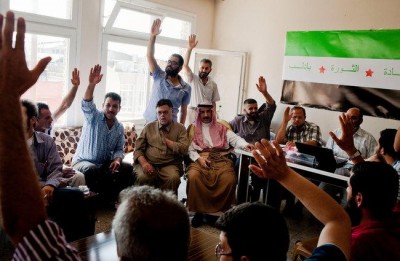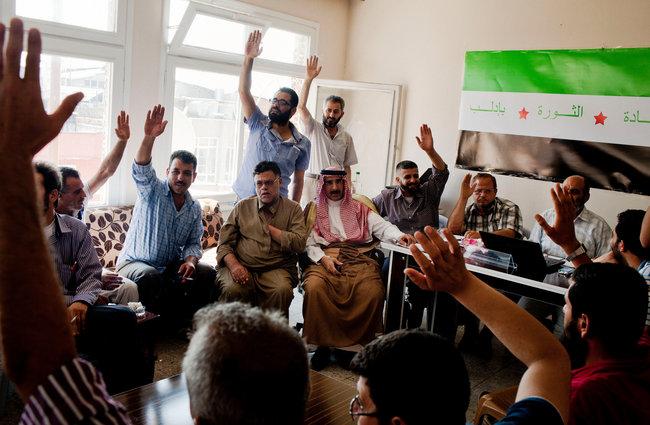 The semantics of war have been thoroughly debated over the years—one man’s terrorist, as they say, is another man’s freedom fighter. These semantics are always changing: in a 1944 Tribune column, George Orwell wrote, “when the Spanish [civil] war broke out the B.B.C. produced the name ‘Insurgents’ for Franco’s followers. This covered the fact that they were rebels while making rebellion sound respectable.” Now, the tide has turned and the word “insurgent”—used, for example, in reference to “anti-American” fighters in Iraq—has come to be more negatively charged than “rebel.”
The semantics of war have been thoroughly debated over the years—one man’s terrorist, as they say, is another man’s freedom fighter. These semantics are always changing: in a 1944 Tribune column, George Orwell wrote, “when the Spanish [civil] war broke out the B.B.C. produced the name ‘Insurgents’ for Franco’s followers. This covered the fact that they were rebels while making rebellion sound respectable.” Now, the tide has turned and the word “insurgent”—used, for example, in reference to “anti-American” fighters in Iraq—has come to be more negatively charged than “rebel.”
Just as calling the participants in wars by different names affects our feelings toward them, so what we call each war itself is also very important (e.g., “the American Civil War” vs. “the War of Northern Aggression”). To refer to Assad’s “crackdown” on the Syrian opposition is to call upon the world’s aid, attention, and condemnation; to call the conflict a full-blown “civil war,” as the media has been calling it lately, is to imply something altogether different. Without prioritizing between these two descriptions, it’s worth looking into what, exactly, the latter term means.
Civil wars are generally defined as wars between two or more groups within a particular nation-state. In the Syrian case, the two main players are the Syrian government and the opposition. The opposition is a complex body in and of itself, composed of many diverse groups who are nonetheless united in their desire to oust the present government.
At least one scholar has argued that the state has to be one of the parties in order for a war to count as “civil,” but in practice it all depends on one’s perspective (to take the example of the American Civil War again, both sides saw themselves as “the state”—that was the whole nature of the conflict). Historians like John Keegan argue that several more conditions must be in place before a war is considered civil—including the presence of uniforms—but his is a minority view.
The nature of civil war has changed significantly since the 20th century. In the past 100 years, civil wars have increased both in quantity and in duration. The result is that, paradoxically, they have become both more and less significant.
On the one hand, many civil wars simply carry on their bloody way in small, forgotten corners of the world with most people being none the wiser. On the other hand, a characteristic feature of the modern civil war is the interference of external actors; you have weapons from country X and support from country Y, and country Z is threatening to invade if you don’t get it all sorted out by December. And the characterization of a particular conflict as a “civil war” appears to justify both emotional distancing—“it’s their fight, why should we get involved?”—and covert operations (a la the Cold War) on the part of foreign nation observers.
In the case of Syria, the use of “civil war” has become much more common in recent months. A UN peacekeeper was one of the first to apply the term back in June, and it appears now to be used without comment.
Now, why does this matter? Violence is violence, and I highly doubt that Syrian civilians are losing sleep over what international policy wonks are calling their terrified days and nights.
Yet the fact that international players are throwing the word around nonetheless could be significant for Syria’s future. Take Assad’s recent statement that he will “live and die in Syria.” This rhetoric comes in response to the offers of David Cameron and others to house him in their countries if he will call for a ceasefire. Assad’s remark is, in essence, playing the “civil war” card against the West—emphasizing that this is a Syrian conflict only, and no one else need intervene. Meanwhile, Time reported recently that President Obama, fresh off his reelection, is already fielding calls demanding to know if he is planning to change his policy on Syria—or, to return to our favorite term, intervene in a civil war.
So war semantics are not just semantics—and, as you follow the situation in Syria, pay close attention to each word and what, exactly, it implies.
